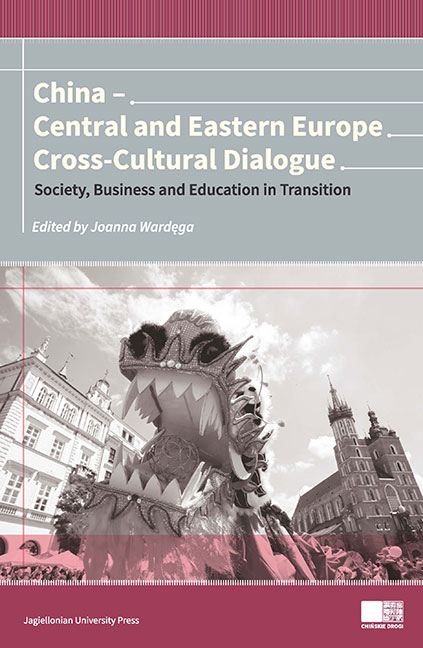Book contents
- Frontmatter
- Contents
- Foreword
- PART I Society and Culture in Transition
- PART TWO Economy and Markets in Transition
- Chinese Economic Influence on the Central and Eastern Europe Countries
- The New Silk Road and its Geopolitical Consequences for Poland
- Comparing Chinese, Japanese and South Korean FDI in Central and Eastern Europe
- Partnership through Investment – Chinese Foreign Direct Investment in CEE Countries
- Chinese Foreign Direct Investments in Europe. The Polish Case
- Fourteen EU States Already in, Japan and USA Still not Interested – What Lies Behind China-led AIIB?
- What Can CEE and China Learn from Each Other in Innovation?
- Comparison of Telecommunications Development Pattern in China and the Republic of Macedonia
- Development of Chinese Mobile Phone Game Market as an Export Opportunity for CEE Mobile Game Producers
- PART THREE Education in Transition
- Contributors
The New Silk Road and its Geopolitical Consequences for Poland
from PART TWO - Economy and Markets in Transition
Published online by Cambridge University Press: 22 December 2017
- Frontmatter
- Contents
- Foreword
- PART I Society and Culture in Transition
- PART TWO Economy and Markets in Transition
- Chinese Economic Influence on the Central and Eastern Europe Countries
- The New Silk Road and its Geopolitical Consequences for Poland
- Comparing Chinese, Japanese and South Korean FDI in Central and Eastern Europe
- Partnership through Investment – Chinese Foreign Direct Investment in CEE Countries
- Chinese Foreign Direct Investments in Europe. The Polish Case
- Fourteen EU States Already in, Japan and USA Still not Interested – What Lies Behind China-led AIIB?
- What Can CEE and China Learn from Each Other in Innovation?
- Comparison of Telecommunications Development Pattern in China and the Republic of Macedonia
- Development of Chinese Mobile Phone Game Market as an Export Opportunity for CEE Mobile Game Producers
- PART THREE Education in Transition
- Contributors
Summary
The New Silk Road has recently become the most famous worldwide Chinese political initiative. Although far from being complete, or even secured, The New Silk Road – providing its success – would present unique opportunities for Poland. It would not only benefit from the short-term economic benefits but could even reverse the effects of its inconvenient geopolitical position.
The New Silk Road: An Introduction
The New Silk Road, or, to be correct, Silk Road Economic Belt/Corridor (later: One Belt One Road) Initiative was announced by the Chinese President Xi Jinping in Astana, in September 2013. During his speech at Nazarbayev university on September 7th 2013, Xi presented five most important policy recommendations: to strengthen policy communication, to improve road connectivity, to promote trade facilitation, to enhance monetary circulation and to strengthen people-to-people exchanges (President Xi Jinping Delivers…). The most important part of his speech came when he urged to “improve traffic connectivity, so as to open the strategic regional thoroughfare from the Pacific Ocean to the Baltic Sea, and gradually move toward the set-up of a network of transportation that connects Eastern, Western and Southern Asia”; also, among other things, he urged the relevant countries to “enhance communication and greenlight regional economic integration in terms of both policy and law” and to “promote local-currency settlement” (Xi suggests China…).
Xi's Astana initiative was soon followed by another step. On the 4th of October 2013, while visiting Indonesia and speaking in the parliament, he proposed a parallel initiative: “building a new maritime silk road”, saying that China and ASEAN countries “share a destiny” and would both benefit from this new idea (Xi in call…). The content of Xi's Indonesia speech was similar to the viewpoint presented in Astana (though of course it differed on details): emphasis on a stronger economic cooperation, including financial aspects, very close cooperation on the joint infrastructure projects (e.g., building roads and railways), the enhancement of security cooperation, and the idea of a “21st century maritime Silk Road” through strengthened “maritime economy, environment technical and scientific cooperation (Szczudlik-Tatar, 2013). Since then, Central Asian and Southeast Asian components of New Silk Road became known in both Chinese media and within the expert circles under one slogan: “One Belt and One Road” (the belt being the maritime route whereas the road being the Central Asian one).
- Type
- Chapter
- Information
- China - Central and Eastern Europe Cross-Cultural Dialogue Society, Business and Education in Transition , pp. 183 - 198Publisher: Jagiellonian University PressPrint publication year: 2016



